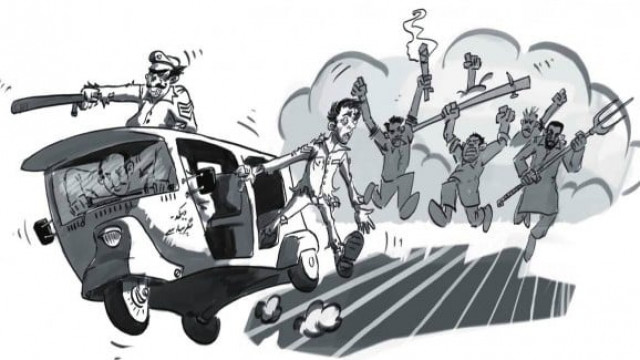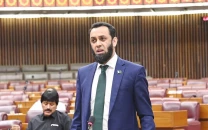Rickshaws to govt: put your money where our mouth is

Rickshaws to govt: put your money where our mouth is
Governor Sindh Dr Ishratul Ebad told the association that all rickshaws must have fourstroke engines by June 30, following the Sindh High Court’s ban on smoke-emitting vehicles in 2007. But so far not even a single rickshaw has been converted under this government scheme. The blame-game, nevertheless, continues. Rickshaw owners have blamed the government for deliberately delaying the project to avoid paying Rs30,000 for the conversion of each rickshaw.
Meanwhile, the transport minister insists that 500 rickshaws will be converted in the initial phase of this scheme, which has yet to kick off. The rickshaw owners are, however, not happy with this scheme as they believe that it will only create unemployment in the city without protecting the environment as most rickshaw drivers cannot afford to convert to four-stroke. The president of the Karachi Taxi and Motor Rickshaw Association, Haziul Haq Hassanzai, told The Express Tribune that they never accepted the ban and they never will.
“If the government wants to see Karachi as an environmentally friendly city then it should ban the substandard oil that is being sold under police supervision,” he said. According to Hassanzai, this oil is the main reason behind the engine failure of vehicles that causes 80 per cent of the smoke in Karachi. He explained that the transport secretary, Rasool Bux Phulpoto, assured them that the department has forwarded a summary on the government’s share of the expenses to the chief minister.
“The president announced a Rs30,000 grant for each rickshaw owner but all in vain,” Hassanzai complained. Meanwhile, Minister for Transport Akhar Jadoon told The Express Tribune that the summary has been passed and they are going to convert 500 rickshaws initially for which they have been allocated Rs10.5 million. Later on, 60,000 more rickshaws will be converted, Jadoon said, adding that the provincial government has awarded tenders for companies interested in converting the engines.
Officials in the department have denied these claims and revealed that the reason why the project is being delayed is because the government has not received any money. According to the Pakistan Standards and Quality Control Authority, the exhaust of twostroke engines contain 4.5 per cent carbon monoxide, which is a major cause of respiratory diseases. These engines also create more noise from oil combustion and fuel leakage.
The four-stroke engine, on the other hand, is environmentally friendly and has a longer lifespan than two-stroke because CNG is distributed between its four cylinders, making them spark fuel at half the rate. Noise pollution is a major cause of mental and physical problems, said communication officer WWF, Saleem Sheikh.
“Karachiites are exposed to a high level of noise pollution, much beyond the allowed limit of 85 to 110 decibels,” he said, adding that there are some areas in Karachi where the noise level was estimated at 120 decibles - equal to that of a jet plane.



















COMMENTS
Comments are moderated and generally will be posted if they are on-topic and not abusive.
For more information, please see our Comments FAQ